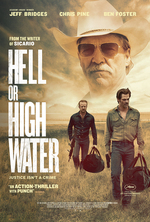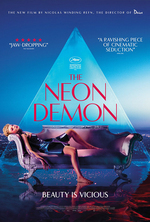Film Screening 3rd March, 2017

Hell or High Water
7:30 PM, 3rd March, 2017
- MA
- 102 mins
- 2016
- David Mackenzie
- Jeff Bridges, Chris Pine, Ben Foster, Gil Birmingham
Do you want to know why Donald Trump won the US Presidential election? Watch this film to understand.
No amount of hand wringing at the result will make people understand the lingering effects of the 2008 global financial crisis on the many normal folk in America. Instead of increasing prosperity, health and earnings are on the decline. The only way to get ahead of debt or homelessness seems to be through crime (not coupons).
Hell or High Water is one of the best movies of 2016 (tied in my opinion with I, Daniel Blake), and shows the dying rust-belt towns and industries, such as farming and manufacturing. It is a neo-Western about a series of bank robberies carried out by two brothers, who are trying to save the family farm after the death of their mother. The older brother (Pine) is calm and measured; the younger (Foster) is reckless, volatile and an ex-criminal, who missed his mother’s funeral while inside and might have killed someone to land him there. A series of holdups of the Texas Midlands Bank, which almost have the farm in their clutches, are targeted as fair game by the brothers, who soon end up with a cunning Texas Ranger (Bridges) on their trail.
Do they manage to pull it off? Are there casualties? What does failed economic recovery look like for the man with no influence or importance? A hint would be the graffiti in the opening scene, which sums up the undercurrent of the movie.
Carol Christopher

The Neon Demon
9:22 PM, 3rd March, 2017
- R
- 117 mins
- 2016
- Nicolas Winding Refn
- Elle Fanning, Jena Malone, Christina Hendricks, Keanu Reeves
With the intensity of Black Swan, the allure of director Nicolas Winding Refn’s earlier Drive, and the audacity of Death Becomes Her, this film treads a delicate path between the disturbing and the satirical. Fresh from a string of arthouse action flicks, the director’s perhaps surprising next step sees Elle Fanning squaring off against L.A. fashionistas.
Fanning plays aspiring model Jesse, who arrives in the City of Angels with only good intentions. Little does she know a bevy of jealous and uncompromising starlets await, who will stop at nothing to ruin her year. With Jena Malone’s kind-yet-creepy new friend, and Keanu Reeves’ utterly unconscionable motel owner, The Neon Demon explores the quest for perfection through a uniquely unnerving lens.
Critics are divided over this somewhat impressionistic film. Stunningly shot, and with a transcendent score from Cliff Martinez, a frequent (and ironic) complaint is the emphasis of style over substance. But the modern incarnation of the genre film often takes this line, usually with great success (see Under the Skin). Here, there is a two-level effect: the plot and characterisation comprise a sharp critique of our obsession with beauty, while the stylistic elements contribute to a pervasive sense of dread, building up to the proverbial shocking conclusion. If you know approximately what to expect, you won’t be disappointed.
Stephen Mann